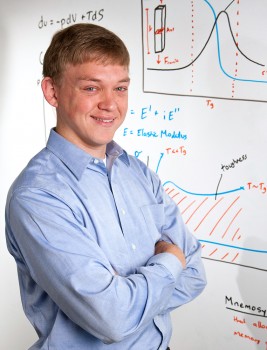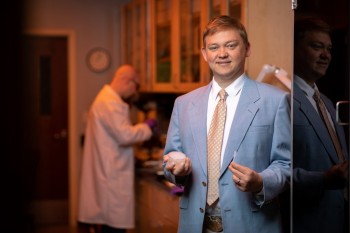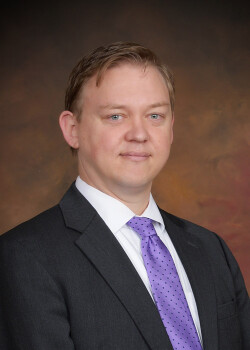PhD - Materials Science and Engineering
Georgia Tech - 2009
Walter Voit
Director - Center for Engineering Innovation
Associate Professor - Materials Science & Engineering
Associate Professor - Mechanical Engineering
Professional Preparation
MS - Artificial Intelligence
UT Dallas - 2006
UT Dallas - 2006
BS - Computer Science
UT Dallas - 2005
UT Dallas - 2005
Publications
Cover Page Space Brayton Corporate Logo - Journal Article
Examples of how graphene can enhance our way of life - Journal Article
Erik Jonsson School of Engineering and Computer Science - Journal Article
Energy Online - Journal Article
EmptyErik pageJonsson School of Engineering & Computer Science - Journal Article
ERROR 404 - Journal Article
Application of shape memory polymers in wettability transition on superomniphobic surfaces - Journal Article
AN IMPROVED UPPER BOUND FOR THE PANCAKE PROBLEM - Journal Article
Appointments
Assistant Professor
UT Dallas [2010–Present]
UT Dallas [2010–Present]
CTO
Syzygy Memory Plastics [2007–Present]
Syzygy Memory Plastics [2007–Present]
Projects
Voit, W., T. Ware, et al. (2009). Xini: A novel organic crosslinker and initiator for acrylic shape-memory polymer networks. Atlanta Chapter of ASM International.
2018–2018Simon, D., W. Voit, et al. (2009). Maximizing Recoverable Strain Capacity in Thermosetting Shape-Memory Polymers Using Response Surfaces. UROP Spring Symposium, Atlanta, GA.
2018–2018Varallo, A., W. Voit, et al. (2009). Synthesis of Thermoset Acrylic Foams with Shape Memory Properties. UROP Spring Symposium, Atlanta, GA.
2018–2018Voit, W., P. Smith, et al. (2009). Using Response Surfaces to Maximize Recoverable Strain Capacity in Thermosetting Shape-Memory Polymers. Integrative Biosystems Launch Conference, Atlanta, GA.
2018–2018Voit, W., T. Ware, et al. (2009). Technological Innovation: Generating Economic Results - Syzygy Memory Plastics: 'Smart' Earpieces with Shape-Memory. IGERT PI Annual Meeting, Washington, DC.
2018–2018Additional Information
Honors and Awards
Best Presentation, 9th annual Ionizing Radiation and Polymers Conference, College Park, MD., 2010 McDermott Faculty Member, 2010 Best Poster Award, NSF IGERT PI Annual Meeting, Washington, DC., 2009 Member, Materials Research Society, 2008 - 2010 Member, TMS, 2008 - 2010 Founder and CTO of Syzygy Memory Plastics, 2007 - 2010 NSF IGERT-Funded TI:GER Fellow, The Georgia Institute of Technology, 2007 - 2009 Presidential Fellow, Georgia Institute of Technology, 2006 - 2009 Erik Jonsson Fellow, University of Texas at Dallas, 2005 - 2006 McDermott Scholar, University of Texas at Dallas, 2001 - 2005
News Articles
UT Dallas Team Infuses Polymer Chemistry into 'Minecraft' Modification
 The 3-D world of the popular “Minecraft” video game just became more entertaining, perilous and educational, thanks to a comprehensive code modification kit, “Polycraft World,” created by UT Dallas professors, students and alumni.
The 3-D world of the popular “Minecraft” video game just became more entertaining, perilous and educational, thanks to a comprehensive code modification kit, “Polycraft World,” created by UT Dallas professors, students and alumni.With “Polycraft World,” the millions of “Minecraft” players worldwide will now be able to incorporate the properties of many materials — chemical elements and compounds — into game action. For example, said Dr. Walter Voit, players could harvest natural rubber from trees, thwart enemies using flamethrowers and jetpacks, explore underwater biomes by scuba diving, or rapidly travel through virtual worlds on pogo sticks wearing custom-molded running shoes.
$1 Million Grant to Help Professor Improve Prosthetics for Soldiers
 Dr. Walter Voit, assistant professor of materials science and engineering and mechanical engineering at The University of Texas at Dallas, has been awarded $1 million to create medical devices that will lead to greater control of prosthetics in wounded soldiers.
Dr. Walter Voit, assistant professor of materials science and engineering and mechanical engineering at The University of Texas at Dallas, has been awarded $1 million to create medical devices that will lead to greater control of prosthetics in wounded soldiers.Voit was one of 25 junior faculty members in the country selected to receive a DARPA Young Faculty Award. The long-term goal of the Defense Advanced Research Projects Agency program is to develop the next generation of scientists and engineers who will focus their careers and research on Department of Defense and national security issues. More than 200 junior faculty applied to receive part of the more than $12 million awarded.
Level Up and Learn: Team Teaches Science Through Video Game
A University of Texas at Dallas team is exploring whether teaching real-world science through a popular computer game may offer a more engaging and effective educational approach than traditional concepts of instruction.In an article recently published in Nature Chemistry, a UT Dallas team — including a materials scientist, two chemists and a game design expert — describes how a group of 39 college students from diverse majors played an enhanced version of the popular video game “Minecraft” and learned chemistry in the process, despite being given no in-class science instruction.
Breaking the Mold: Dr. Voit Designs New Plastics Technology
 Think about your favorite product. Your best sounding headphones, most comfortable pair of blue jeans, or maybe the trustworthy family car you drove in college that inspired you to buy a newer model after graduation. We seek brands we trust. We refer them to our family and friends. Most importantly, we return to them time and again because they become a part of our identity.
Think about your favorite product. Your best sounding headphones, most comfortable pair of blue jeans, or maybe the trustworthy family car you drove in college that inspired you to buy a newer model after graduation. We seek brands we trust. We refer them to our family and friends. Most importantly, we return to them time and again because they become a part of our identity.
UTD Spinoff Company’s Sale Takes 3D Printing to Scale
 The recent sale of The University of Texas at Dallas spinoff company Adaptive3D paves the way for large-scale manufacturing of 3D-printed specialized plastic and rubber materials developed at the University.
The recent sale of The University of Texas at Dallas spinoff company Adaptive3D paves the way for large-scale manufacturing of 3D-printed specialized plastic and rubber materials developed at the University.